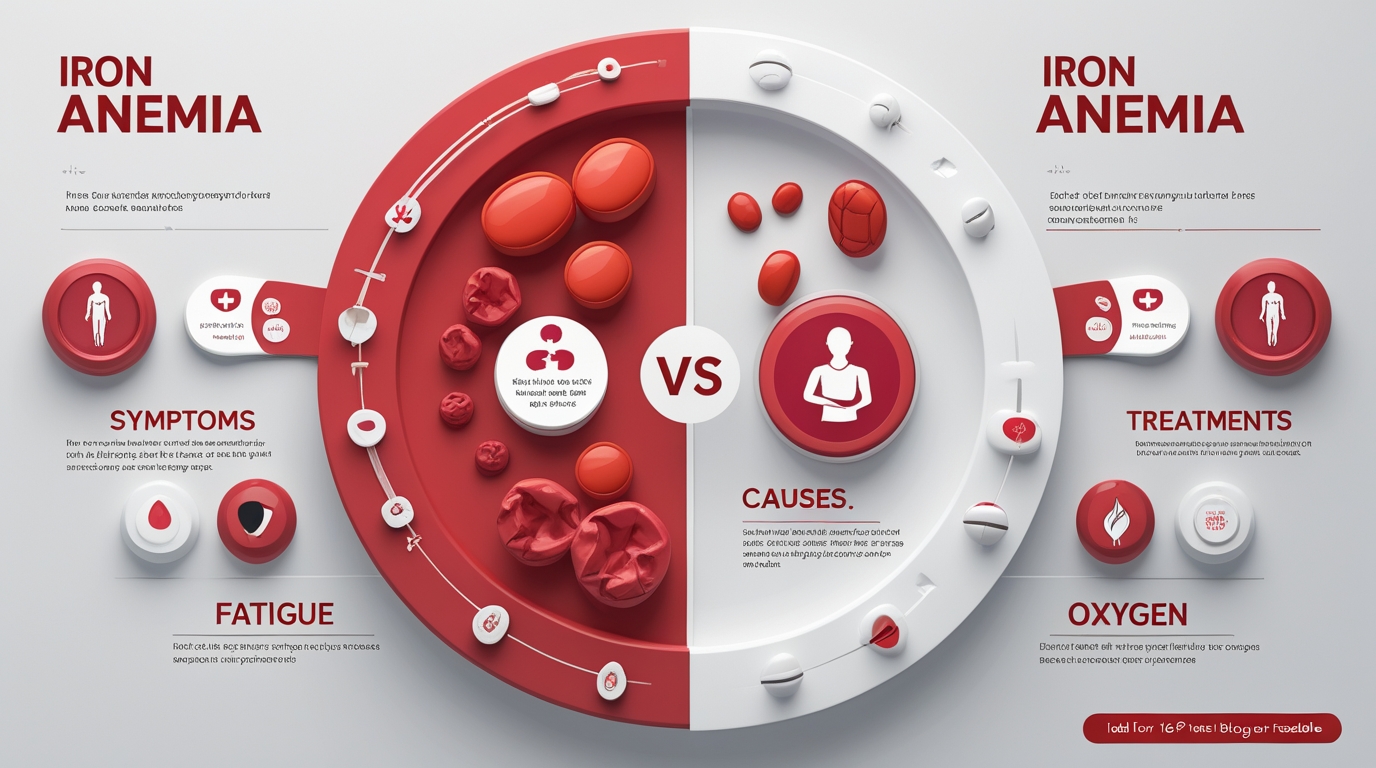Iron Deficiency vs. Anemia – Introduction
Iron deficiency vs. anemia is a commonly misunderstood topic. While the two conditions are closely related, they are not identical. Iron deficiency refers to a lack of iron in the body, while anemia is a broader term that includes a variety of conditions where there aren’t enough healthy red blood cells to carry oxygen effectively.
In this 2025 guide, we’ll explore the key differences, causes, symptoms, treatments, and prevention strategies. Additionally, we’ll provide links to trusted health resources and practical tips to manage both conditions naturally.
What is Iron Deficiency?
Iron deficiency occurs when your body lacks sufficient iron to support essential functions such as oxygen transport and energy production. This condition can develop slowly and often goes unnoticed until it becomes serious.
Causes of Iron Deficiency
- Inadequate dietary intake
- Heavy menstruation
- Blood loss (injury or internal bleeding)
- Poor absorption (e.g., celiac disease)
Read More: Iron Deficiency Symptoms in Women
What is Anemia?
A disorder known as anemia occurs when your blood does not contain enough hemoglobin or healthy red blood cells. Anemia is frequently brought on by iron deficiency; however, it can also be brought on by:
Other Causes of Anemia:
- Vitamin B12 deficiency
- Folate deficiency
- Chronic diseases (e.g., kidney disease, cancer)
- Genetic conditions (e.g., sickle cell anemia)
Explore: Vitamin D Guide for Americans, a helpful resource to support your overall health.
Iron Deficiency vs. Anemia – Key Differences
| Feature | Iron Deficiency | Anemia |
| Definition | Low iron stores in the body | Low hemoglobin or red blood cells |
| Cause | Poor diet, bleeding, absorption issues | Often caused by iron deficiency, but may have other causes |
| Symptoms | Fatigue, pale skin, hair loss | Fatigue, shortness of breath, dizziness |
| Diagnosis | Blood test (ferritin, serum iron) | Complete blood count (CBC) test |
| Treatment | Iron supplements, dietary changes | Iron, B12, folate, or transfusion—based on cause |
Symptoms of Iron Deficiency and Anemia
Shared Symptoms:
- Fatigue
- Weakness
- Pale skin
- Cold hands and feet
- Dizziness
Iron Deficiency-Specific:
- Craving ice, clay, or dirt (pica)
- Hair thinning
- Brittle nails
Anemia-Specific:
- Irregular heartbeat
- Chest pain
- Headaches
How Are Iron Deficiency and Anemia Diagnosed?
Doctors typically use blood tests:
- Iron Deficiency: Ferritin, serum iron, TIBC (total iron-binding capacity)
- Anemia: Complete blood count (CBC), hemoglobin, and hematocrit levels
Helpful Resource: High Calcium in Blood and how it relates to nutrient balance.
Best Treatments for Iron Deficiency and Anemia
For Iron Deficiency:
- Iron-rich diet (red meat, lentils, spinach)
- Iron supplements
- Vitamin C to improve iron absorption
- Avoid calcium-rich foods near iron intake
Read: Best Time to Take Iron Supplements
For Anemia (Varies by Type):
- Iron, B12, or folate supplements
- Diet adjustments
- Addressing underlying conditions
- In severe cases, blood transfusion
Also Check: Iron-Rich Foods
Amazon Affiliate Product Recommendations
- Nature’s Bounty Iron 65 mg Tablets – View on Amazon
- Vitron-C High Potency Iron with Vitamin C – Buy on Amazon
Note: These are affiliate links. We may earn a small commission at no extra cost to you.
Prevention Tips
- Eat iron-rich foods regularly
- Include sources of B12 and folate
- Avoid excessive tea or coffee (they block iron)
- Monitor iron levels during pregnancy or menstruation
- Stay hydrated and active
Explore: Magnesium Benefits
FAQs – Iron Deficiency vs. Anemia
Are iron deficiency and anemia the same?
Although iron deficiency is a major cause of anemia, several other factors can also lead to it.
Can you have anemia without iron deficiency?
Yes. Anemia can also be caused by B12 or folate deficiency, chronic illnesses, or genetic factors.
What foods help with iron and anemia?
Red meat, lentils, leafy greens, iron-fortified cereals, and vitamin C-rich fruits.
How long does it take to recover from anemia?
Mild anemia can improve within weeks of treatment. Severe cases may take months.
Should I take iron daily if I feel tired?
Only if your doctor advises it. Tiredness can have many causes.
Conclusion – Iron Deficiency vs. Anemia
Understanding the distinction between iron deficiency vs. anemia is crucial for proper diagnosis and treatment. For more in-depth information, visit the Cleveland Clinic’s Anemia Overview, a trusted medical resource. While both can cause similar symptoms, they are not always the same. If you suspect either condition, consult a healthcare professional, get tested, and take appropriate steps to recover.
Stay informed, eat smart, and take care of your health!
Call to Action
Found this helpful? Share it with friends or family.
Check out our recommended supplements for anemia and iron deficiency.
Leave a comment or question below to join the conversation!
Disclaimer
This article is for informational purposes only and does not substitute for medical advice. Always consult your healthcare provider before starting any new supplement or treatment.
Last Updated: July 7, 2025


Hi I am a content marketer. I want to publish my client’s articles on your site. Please let me know your pricing criteria and guidlines. Thank you